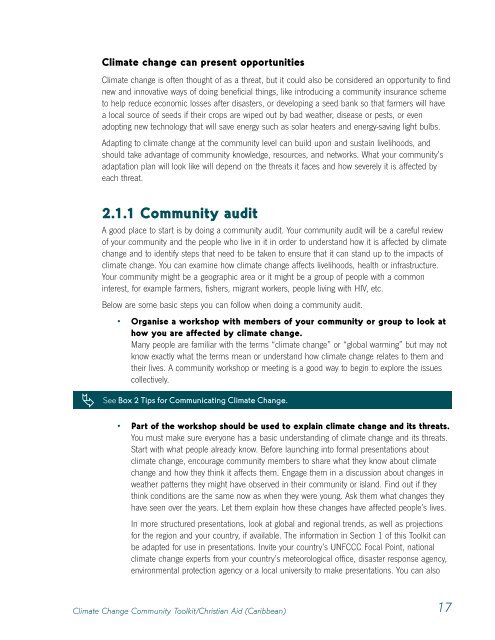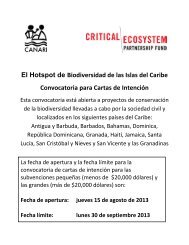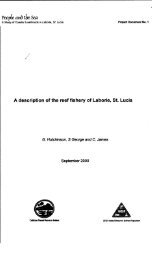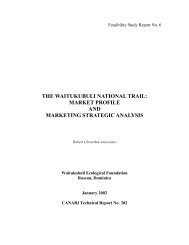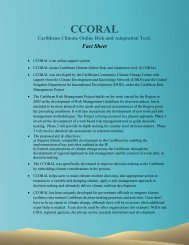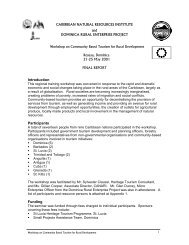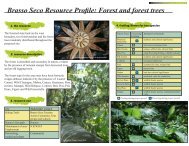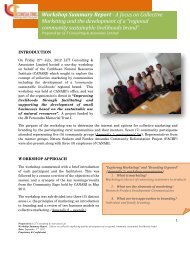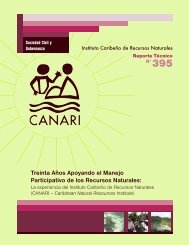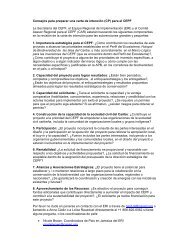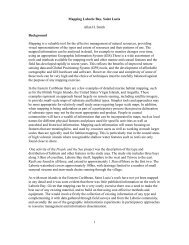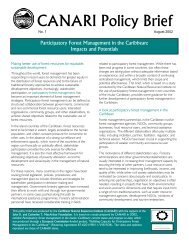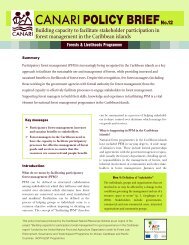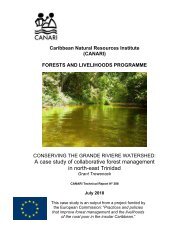Addressing Climate Change in the Caribbean: A Toolkit ... - CANARI
Addressing Climate Change in the Caribbean: A Toolkit ... - CANARI
Addressing Climate Change in the Caribbean: A Toolkit ... - CANARI
You also want an ePaper? Increase the reach of your titles
YUMPU automatically turns print PDFs into web optimized ePapers that Google loves.
<strong>Climate</strong> change can present opportunities<br />
<strong>Climate</strong> change is often thought of as a threat, but it could also be considered an opportunity to f<strong>in</strong>d<br />
new and <strong>in</strong>novative ways of do<strong>in</strong>g beneficial th<strong>in</strong>gs, like <strong>in</strong>troduc<strong>in</strong>g a community <strong>in</strong>surance scheme<br />
to help reduce economic losses after disasters, or develop<strong>in</strong>g a seed bank so that farmers will have<br />
a local source of seeds if <strong>the</strong>ir crops are wiped out by bad wea<strong>the</strong>r, disease or pests, or even<br />
adopt<strong>in</strong>g new technology that will save energy such as solar heaters and energy-sav<strong>in</strong>g light bulbs.<br />
Adapt<strong>in</strong>g to climate change at <strong>the</strong> community level can build upon and susta<strong>in</strong> livelihoods, and<br />
should take advantage of community knowledge, resources, and networks. What your community’s<br />
adaptation plan will look like will depend on <strong>the</strong> threats it faces and how severely it is affected by<br />
each threat.<br />
2.1.1 Community audit<br />
A good place to start is by do<strong>in</strong>g a community audit. Your community audit will be a careful review<br />
of your community and <strong>the</strong> people who live <strong>in</strong> it <strong>in</strong> order to understand how it is affected by climate<br />
change and to identify steps that need to be taken to ensure that it can stand up to <strong>the</strong> impacts of<br />
climate change. You can exam<strong>in</strong>e how climate change affects livelihoods, health or <strong>in</strong>frastructure.<br />
Your community might be a geographic area or it might be a group of people with a common<br />
<strong>in</strong>terest, for example farmers, fishers, migrant workers, people liv<strong>in</strong>g with HIV, etc.<br />
Below are some basic steps you can follow when do<strong>in</strong>g a community audit.<br />
• Organise a workshop with members of your community or group to look at<br />
how you are affected by climate change.<br />
Many people are familiar with <strong>the</strong> terms “climate change” or “global warm<strong>in</strong>g” but may not<br />
know exactly what <strong>the</strong> terms mean or understand how climate change relates to <strong>the</strong>m and<br />
<strong>the</strong>ir lives. A community workshop or meet<strong>in</strong>g is a good way to beg<strong>in</strong> to explore <strong>the</strong> issues<br />
collectively.<br />
See Box 2 Tips for Communicat<strong>in</strong>g <strong>Climate</strong> <strong>Change</strong>.<br />
• Part of <strong>the</strong> workshop should be used to expla<strong>in</strong> climate change and its threats.<br />
You must make sure everyone has a basic understand<strong>in</strong>g of climate change and its threats.<br />
Start with what people already know. Before launch<strong>in</strong>g <strong>in</strong>to formal presentations about<br />
climate change, encourage community members to share what <strong>the</strong>y know about climate<br />
change and how <strong>the</strong>y th<strong>in</strong>k it affects <strong>the</strong>m. Engage <strong>the</strong>m <strong>in</strong> a discussion about changes <strong>in</strong><br />
wea<strong>the</strong>r patterns <strong>the</strong>y might have observed <strong>in</strong> <strong>the</strong>ir community or island. F<strong>in</strong>d out if <strong>the</strong>y<br />
th<strong>in</strong>k conditions are <strong>the</strong> same now as when <strong>the</strong>y were young. Ask <strong>the</strong>m what changes <strong>the</strong>y<br />
have seen over <strong>the</strong> years. Let <strong>the</strong>m expla<strong>in</strong> how <strong>the</strong>se changes have affected people’s lives.<br />
In more structured presentations, look at global and regional trends, as well as projections<br />
for <strong>the</strong> region and your country, if available. The <strong>in</strong>formation <strong>in</strong> Section 1 of this <strong>Toolkit</strong> can<br />
be adapted for use <strong>in</strong> presentations. Invite your country’s UNFCCC Focal Po<strong>in</strong>t, national<br />
climate change experts from your country’s meteorological office, disaster response agency,<br />
environmental protection agency or a local university to make presentations. You can also<br />
<strong>Climate</strong> <strong>Change</strong> Community <strong>Toolkit</strong>/Christian Aid (<strong>Caribbean</strong>) 17


